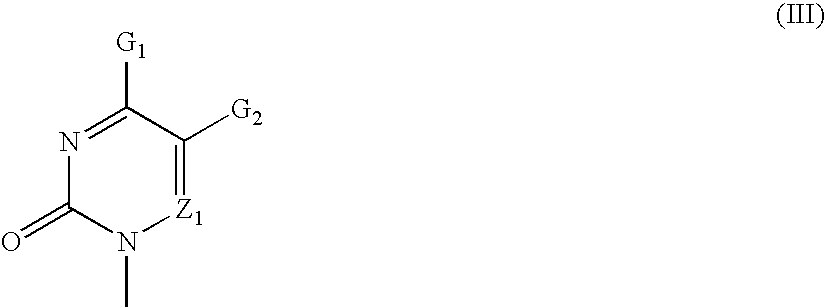Nucleotide mimics and their prodrugs
a technology of nucleotide mimics and prodrugs, applied in the direction of antibacterial agents, drug compositions, group 5/15 element organic compounds, etc., can solve the problems of complex process of transformation of normal cells into cancer cells, drug-resistant life-threatening bacteria, and major threat to human health
- Summary
- Abstract
- Description
- Claims
- Application Information
AI Technical Summary
Problems solved by technology
Method used
Image
Examples
example 1
2′-Deoxy-(E)-2′-fluoromethylenecytidine 5′-imidodiphosphate (3)
[1006]Trichloro[(dichlorophosphoryl)imido]phosphorane (83 mg, 0.39 mmol) was added to 2′-deoxy-(E)-2′-fluoromethylenecytidine (50 mg, 0.19 mmol) in anhydrous trimethyl phosphate (3 mL) at −15° C. under an argon atmosphere. After stirring for 2 h the reaction mixture was poured into ice-cold triethylammonium bicarbonate (TEAB) solution (pH 7.0, 1.0 M, 5 mL) and stirred for 30 minutes. Purification by HPLC gave 9.0 mg of the titled compound 3.
example 2
2′-Deoxy-(E)-2′-fluoromethylenecytidine 5′-methylenediphosphonate (4)
[1007]Methanephosphonic dichloride (98 mg, 0.39 mmol) was added to 2′-deoxy-(E)-2′-fluoromethylenecytidine (50 mg, 0.19 mmol) in anhydrous trimethyl phosphate (3 mL) at −15° C. under an argon atmosphere. After stirring for 2 h the reaction mixture was poured into an ice-cold TEAB solution (1.0 M, 5 mL) and stirred for 30 minutes. Purification by HPLC gave 8.6 mg of the titled compound 4.
example 3
2′-Deoxy-2′,2′-difluorocytidine-5′-methylenediphosphonate (5)
[1008]2′-Deoxy-2′,2′-difluorocytidine (0.2 g, 0.76 mmol) was dissolved in anhydrous trimethyl phosphate (2 mL) and stirred with molecular sieves under an argon atmosphere for 16 h. The mixture was cooled to −20° C. under an argon atmosphere and methylenebis(phosphonic dichloride) (380 mg, 1.52 mmol) was added. After stirring for 1 h the mixture was quenched using ice-cold TEAB solution (1.0 M, 10 mL) and stirred for 30 minutes. Purification by HPLC gave 28.9 mg of the titled compound.
PUM
| Property | Measurement | Unit |
|---|---|---|
| flow rate | aaaaa | aaaaa |
| particle size | aaaaa | aaaaa |
| pH | aaaaa | aaaaa |
Abstract
Description
Claims
Application Information
 Login to View More
Login to View More - R&D
- Intellectual Property
- Life Sciences
- Materials
- Tech Scout
- Unparalleled Data Quality
- Higher Quality Content
- 60% Fewer Hallucinations
Browse by: Latest US Patents, China's latest patents, Technical Efficacy Thesaurus, Application Domain, Technology Topic, Popular Technical Reports.
© 2025 PatSnap. All rights reserved.Legal|Privacy policy|Modern Slavery Act Transparency Statement|Sitemap|About US| Contact US: help@patsnap.com



